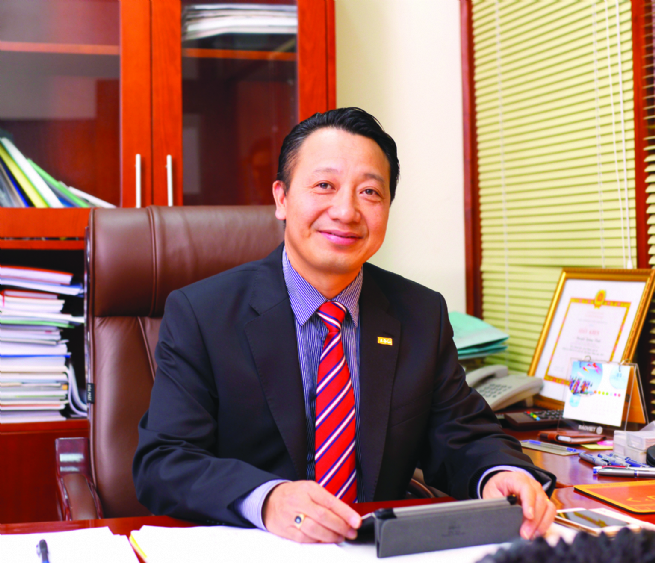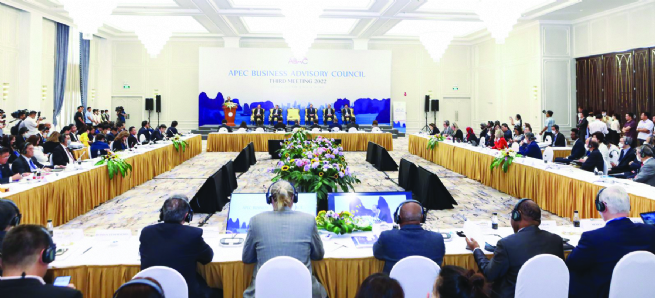Together with ABAC to Create Sustainable Value
At the upcoming third APEC Business Advisory Council (ABAC III) Meeting in Hai Phong City, the theme “Sustainable Trade and Investment” will take center stage, reflecting a rising global priority in regional and international economic cooperation.
To better understand the significance of this theme for Vietnamese businesses as well as how to actively participate in the region's sustainable value chains, we have an interview with Mr. Nguyen Quang Vinh, Vice President of the Vietnam Chamber of Commerce and Industry (VCCI) and Alternate Member of ABAC Vietnam.
 |
The theme “Sustainable Trade and Investment” of the third Meeting of ABAC reflects a new wave of globalization. In your view, what should Vietnamese businesses do to take the initiative in joining the sustainable value chains that are now forming in the APEC region?
Choosing the “Sustainable Trade and Investment” theme as one of its core pillars clearly signals a shift in globalization thinking. We are entering an era where speed and cost are no longer the sole decisive factors, but transparency, social responsibility, and environmental impact have become the core criteria in building economic relationships.
For Vietnamese businesses, this presents both a challenge and an opportunity to restructure their operating models. To actively and effectively participate in APEC’s sustainable value chains, I believe that three priorities must be addressed:
Mr. Nguyen Quang Vinh
First, internal restructuring. Businesses must quickly adopt international standards for sustainability reporting, especially following the ESG (Environmental - Social - Governance) framework. This is the common language used by multinational corporations and global investment funds to evaluate collaboration potential. Transparency in governance, climate commitments, and the protection of labor rights are no longer just “good intentions,” they are mandatory conditions.
Second, technology and innovation. Megatrends like clean technology, digital transformation, AI, blockchain, and traceability are becoming standards in supply chain management. Vietnamese businesses must invest seriously to adapt, not only to meet partners' requirements but also to boost their competitiveness in the market.
Third, long-term strategy. A mindset of sustainable growth must be integrated throughout the entire product lifecycle, from design, material selection, and supply chain building to distribution. Instead of maximizing short-term profits, we need to optimize long-term value and to factor in environmental and social costs from the outset.

The ABAC III 2022 meeting was hosted by Vietnam and jointly organized by VCCI and ABAC Vietnam
Additionally, one crucial point is that businesses, especially those in the private sector and small and medium-sized enterprises (SMEs), need support from the policy ecosystem, both at the central and local levels. This includes guidance, access to green and digital finance, and international connectivity. But to be effectively supported, businesses must also take the initiative to engage with reputable intermediaries like VCCI and international organizations and be willing to transform to become reliable partners in the region’s sustainable value chains.
For you, what should Vietnamese businesses, especially those in the private sector, do to absorb recommendations on the one hand and contribute to shaping APEC’s future agenda on the other?
That is a very important question. ABAC is not just a forum for businesses to grasp policy recommendations from advanced economies but also a platform for us to raise our voices, propose initiatives, and co-create the region’s development agenda.
To do so, Vietnamese businesses must first enhance their global literacy - that is, to understand the megatrends shaping the world, such as energy transition, digital economy, circular economy, and supply chain security. Access to information, policy updates, and the ability to analyze macro-level impacts will help businesses form strategic perspectives when making recommendations or participating in policy debates.
Second, businesses need to actively participate in ABAC’s working groups on finance, sustainable development, digitalization, healthcare, entrepreneurship, and more. These groups are where in-depth policy discussions take place and serve as the foundation for ABAC’s reports to APEC Leaders.
The role of Vietnam’s leading businesses is extremely important. They have practical experience, innovation capacity, and the ability to lead thinking, thus helping ABAC Vietnam craft recommendations that are both practical and visionary. VCCI, as the national contact person for ABAC Vietnam, is always ready to support and connect businesses to these influential channels.
Lastly, establishing two-way interaction mechanisms between the business community and policymakers through workshops, consultation forums, and international trade promotion events, will help amplify the business voice. We are working to set up such channels so that Vietnamese businesses are no longer “followers” but active partners in shaping the regional cooperation framework.
Vietnam’s upcoming chairmanship of ABAC in 2027 carries strategic significance. What steps does VCCI plan to take to build policy dialogue capacity and strategic thinking among Vietnamese entrepreneurs?
Vietnam’s assumption of ABAC chairmanship in 2027 is a pivotal opportunity. This is not only a chance to showcase our national standing but also a strategic opportunity to shape the future of APEC economic cooperation in a more inclusive, cohesive, and sustainable direction.
However, to fulfill the ABAC chairmanship effectively and meaningfully, we must begin preparations now in terms of people, institutions, and policy thinking.
Right from the third ABAC Meeting, ABAC Vietnam has collaborated with the Hai Phong People's Committee to organize a series of investment promotion, business networking, and APEC partnership activities. These are initial steps to build “soft power” for the Vietnamese business community.
In the coming time, VCCI/ABAC Vietnam will implement several key initiatives:
First, designing specialized training programs for businesses on ESG, digital economy, green economy, and innovation, with participation from APEC experts. These programs will update businesses on the latest knowledge and foster a community of entrepreneurs sharing a long-term development vision.
Second, organizing international investment and trade promotion events, inviting multinational corporations, major investment funds, and strategic partners to Vietnam. These will be platforms for Vietnamese businesses to learn global thinking and establish strategic partnerships.
Third, encouraging the presence of Vietnamese businesses at major ABAC events, especially the APEC CEO Summit, which gathers top global business leaders. This is where we can showcase our capabilities, share solutions, and assert Vietnam’s position.
Fourth, promoting bilateral and multilateral cooperation projects to gradually integrate Vietnamese businesses into global economic networks while expanding our space for policy innovation.
Finally, establishing a strategic advisory mechanism between ABAC Vietnam with the private sector, research institutes, and international organizations. This will serve as a “knowledge foundation” enabling Vietnam to craft deep, impactful recommendations when assuming the ABAC chairmanship.
The future of integration doesn’t just lie in “participating” but in how we can help “shape” the global playing field. With thorough preparation from today, Vietnam can enter 2027 as a leading nation and Vietnamese businesses, either large or small, can become strategic players in sustainable global value chains.
Thank you very much!








